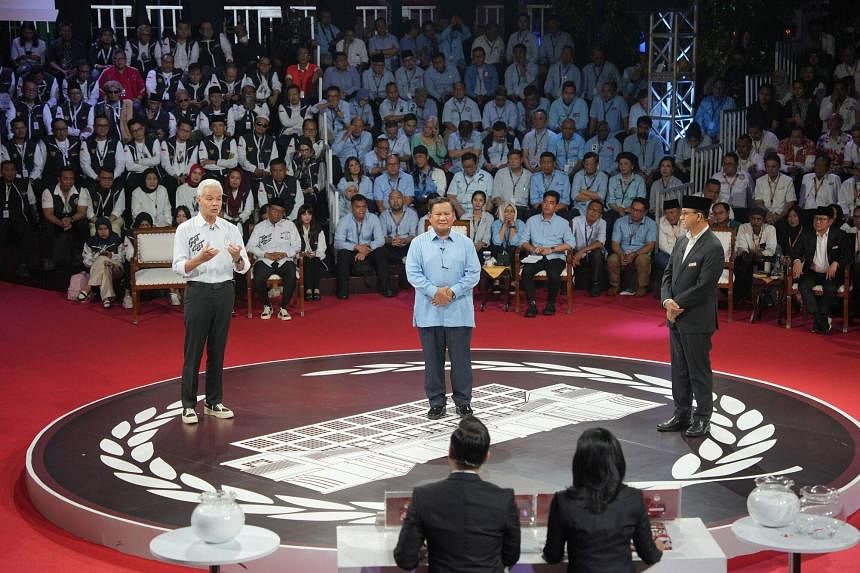JAKARTA - Indonesia’s presidential front runner Prabowo Subianto on Dec 12 kicked off the series of televised election debates by riding out a flurry of punches from his opponents on political hot-potato issues, from the controversial Constitutional Court ruling on the minimum age of presidential and vice-presidential candidates to backsliding democracy in the country.
Mr Prabowo, who is Defence Minister; former Jakarta governor Anies Baswedan; and former Central Java governor Ganjar Pranowo took turns to express their opinions on wide-ranging issues, from the separatist conflict in the eastern region of Papua to the rights of religious minorities and the quality of public service.
But as the debate progressed, they wasted no time in hurling barbs and getting at one another’s throats. Their faces turned red and their voices quivered, as their supporters packing the hall cheered them on.
Mr Anies asked Mr Prabowo for his view on the “serious ethical violation” on the court ruling lowering the minimum age for presidential and vice-presidential candidates from 40 to 35 years, paving the way for President Joko Widodo’s 36-year-old son Gibran Rakabuming Raka to join the race as Mr Prabowo’s running mate.
A judicial panel on Nov 7 found the Constitutional Court’s chief justice Anwar Usman, who is the President’s brother-in-law, guilty of a conflict of interest over his part in the ruling.
To this, Mr Prabowo said the court decision was “final and cannot be changed”, and to let the voters decide at the ballot box on Feb 14, 2024.
“We are not small children, Mr Anies, that is enough. Let the people judge, let the people decide. If the people do not like Prabowo and Gibran, don’t choose us,” he said.
With his voice raised by a few octaves, and his supporters cheering in the background, Mr Prabowo continued: “Sorry to say, Mr Anies, I have nothing and I am ready to die for this country.”
From Dec 12 to Feb 4, the General Election Commission (KPU) will host three presidential and two vice-presidential debates, broadcast live on TV and social media sites.
Expert panellists were invited to set questions on topics from defence and international relations, to digital economy and environmental issues. Dec 12’s debate centred on law, human rights, governance, corruption, democracy and tolerance.
Mr Anies, who has positioned himself to be the voice of change among the contenders, criticised the erosion of democracy and freedom of speech in the country.
Making a jibe at Mr Gibran, Mr Anies said: “We see today, one millennial can become a vice-presidential candidate but there are thousands of millennials, Generation Z... when they express opinions, when they criticise the government, they are often faced with clashes and even tear gas. Should we tolerate this condition?”
The 72-year-old Prabowo, who has positioned himself as a follower of Mr Widodo’s policies, said Mr Anies was being “excessive with (his) complaints on democracy”.
“You were elected as Jakarta governor (in a contest) against the government that was in power then. If democracy didn’t work, if Jokowi is a dictator, it is not possible that you, being in opposition, could be elected,” he said, referring to the President by his nickname.
The latest opinion polls, carried out during the first week of campaigning, have placed Mr Prabowo comfortably ahead of his opponents, leaving Mr Ganjar and Mr Anies battling for a run-off spot.
In a poll by Indonesia Survey Institute, the electability of Mr Prabowo and Mr Gibran was 45.6 per cent in December, or 9.7 percentage points higher than in October, while Mr Anies and his running mate, former minister Muhaimin Iskandar, scored 22.3 per cent, 2.7 percentage points higher. The electability of the third pair, Mr Ganjar and Chief Security Minister Mahfud MD, however, slid 2.3 per cent from two months ago to 23.8 per cent. Some 8.3 per cent of respondents either remained undecided or did not answer.
A separate survey by the research arm of local daily Kompas, carried out between Nov 29 and Dec 4, placed the electability of Mr Prabowo and Mr Gibran at 39.3 per cent, followed by Mr Anies and Mr Muhaimin at 16.7 per cent and Mr Ganjar and Mr Mahfud at 15.3 per cent.
A significant number of Mr Widodo’s supporters who voted for him in the 2019 election have shifted their support from Mr Ganjar, who is from the same Indonesian Democratic Party of Struggle (PDI-P), to Mr Prabowo, analysts say. PDI-P’s recent criticisms against Mr Widodo had also backfired, further eroding support for Mr Ganjar.
Indikator Politik executive director Burhanuddin Muhtadi was quoted as saying by the Jakarta Post: “Lately, Ganjar and the PDI-P have built upon a strategy of going on the offensive and dissociating themselves from the President. Even if (the PDI-P) thinks it has a genuine reason (behind this tactic), it is still like shooting themselves in the foot.”


